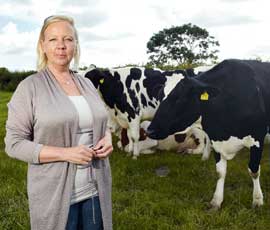Debate rages on over large-scale dairy farms

Dairy leaders and animal welfare campaigners have agreed to hold talks in a bid to resolve their differences over the future direction of the sector.
The surprise move follows claims by the World Society for the Protection of Animals that better returns can be made from average-sized, grass-based dairy herds than from large-scale dairy units.
Endorsed by Dragons’ Den TV star Deborah Meaden – who said she would never invest in a large-scale dairy farm because it was too high risk – the WSPA claims were made in a report launched last Friday (9 September).
The document brought a swift and damning response from industry body DairyCo, which accused WSPA of using “false assumptions” and demonstrating “astonishing naivety” about the economics and infrastructure of dairy farming in Britain.
One week later, tempers have somewhat cooled. DairyCo continues to dispute the economic analysis on which the WSPA report is based. But it appears that the two organisations do share some common ground – and have much to talk about.
Debate on dairy farming strategy
Amanda Ball, DairyCo head of marketing and communications, told Farmers Weekly she would welcome a “constructive debate” with WSPA representatives face-to-face so the industry body could explain its concerns.
“We are happy to discuss the facts with them. In fact, some of the points made in the report about the current financial situation that dairy farmers find themselves in concur with recent reports from DairyCo, such as Dairy Supply Chain Margins.”
Ms Ball added: “We have offered to meet with WSPA, the report’s authors and supporters – including Deborah Meaden – to explain our concerns over the economic analysis and some of the other issues raised in the report.”
It would be premature to portray this as some kind of love-in. And DairyCo insists suggestions that farmers are being railroaded into going intensive could not be further from the truth. The industry actively supports and embraces diversity, it maintains.
Farm animal welfare
On the vast majority of British dairy farms – both big and small – cows graze outdoors during the summer and stay under cover during the winter, whatever system of housing is used, said Ms Ball.
At the same time, compliance with the Red Tractor Assurance Dairy Scheme requires farmers to ensure that buildings and herd management allow cows to enjoy the Farm Animal Welfare Council’s “Five Freedoms” that define good welfare.
“Just like the size and types of dairy herd are not for DairyCo to decide, we suggest that WSPA dictating how people should farm will not solve the much-debated challenges surrounding the sustainability of milk production,” said Ms Ball.
“If the WSPA is genuine about having animal welfare at the heart of its existence and if it really does want to help dairy farmers become more sustainable, then DairyCo and WSPA will have a lot of common ground.”
Decline in UK dairy industry
It is a debate welcomed by Simon Pope, head of external affairs at WSPA UK. The report was a conversation-starter to get farmers – and consumers – weighing up the worth of an intensive dairy future, he said.
“The decline in the UK dairy industry is not to do with which production method we use, or competition from cheap imports, but rather the stranglehold on the price a farmer can achieve.”
Britain as a whole should be asking why the continuing exodus of dairy farmers is being blithely accepted, said Mr Pope. Without action, the industry could face similar erosion to the decimation of the typical British high street, he added.
“When we call for re-evaluation of the potential of grass-based systems, it is not out of some romantic yearning for yesteryear, but because there is an achievable, sustainable and smart business model built on pasture.”
DairyCo still has questions over WSPA’s “call for action”. But Mr Pope insists that the grass-based system proposed in the report – based on the observations of farmers, economists and academics – is radical only in its simplicity.
“It doesn’t shun technology, but sets it in its rightful place, streamlining and supporting farm operations, not to enslaving farmers to perceived efficiencies. Crucially, it is the system as much as the herd size that is important.
“The response to low milk prices is invariably a drive to increase yields, which builds in costs, heaping pressure on farmers to continually chase more litres in pursuit of elusive economies of scale.”
Many producers, said Mr Pope, lack the resources to keep running on this endless treadmill. “Instead, we must support an industry that shifts focus away from volume and towards value if we are to create something truly sustainable.”
The dairy industry should open up the debate to concerned consumers and the increasingly wide range of organisations like WSPA who were seeking answers to the dairy farming crisis, Mr Pope added.
“Reaching out to their communities and considering the alternatives set out in this report might just be one positive step on the road towards a better future for Britain’s dairy farmers. But, it’s a step forward that the industry will need to support.”
